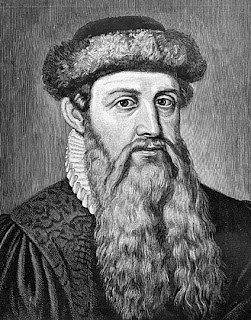Remaking The World With Words - Plus, How To Read Them
Johannes Gutenberg (1400-1468)
The details of these important events in world history and what led to an invention that deeply influenced them all is a story well told in Gutenberg: How One Man Remade the World with Words (2002) by John Man. This book is an excellent description of the life and times of Johannes Gutenberg, and the impact of his 1440 invention, the movable type printing press.
EXCERPT
"Gutenberg's invention had created the possibility of an intellectual genome, a basis of knowledge which could be passed from generation to generation, finding expression in individual books, as the human genome is expressed in you and me itself remaining untouched, a river of knowledge into which every new generation could tap and to which it could add, even after the last press ceases, and paper is no more, and all that the vast store of accumulated knowledge is gathered in hyperspace. For there, in perpetuo, will be Gutenberg's Bible in all its electronic glory, to remind our children's children that this was the thing that started the revolution made by Johannes Gutenberg."
Example of a European Printing Press 1568
An Early Printing Press with Movable Type
For more on the great inventions in human evolutionary history see here.
~~~~~~~~~
As for how to read, there's this:
by
Zat Rana
Medium
June 8, 2018
EXCERPT
"Reading is telepathy, and a book is the most powerful technology invented.
"Reading is telepathy, and a book is the most powerful technology invented.
"Homer, Shakespeare, Voltaire, Flaubert, Tolstoy, Woolf, Hemingway — these are names without a living body. We can’t talk to them, nor touch them, but their thoughts are immortalized through the written word.
"Aristotle’s logic, Kepler’s astronomy, Newton’s physics, Darwin’s biology, Wittgenstein's philosophy — these are memes without living originators. They no longer champion their ideas, and yet, we still talk about them.
"Without books, humans would never have escaped the boundaries of space and time. Each new generation would have had to learn the realities of life for themselves rather than having the luxury to build on the past; knowledge accumulation would have quickly dimmed towards an asymptote.
"Everything that we value in the modern world has its root in invention of writing. Everything that we have accomplished has come from reading.
"Even on an individual level, one of the most effective ways to learn about the world is to dip your toes into the wisdom of the past. Instead of spending your life figuring out how the mind works, you can just seek out the experience of someone who already knows. Rather deducing the laws of nature yourself, you can simply refer to an existing body of work.
"Even beyond that, reading is a joy. It’s a touch of growth, it’s a beacon of inspiration, and it’s source of connection. We are how we spend our time, and we become what we consume. It only makes sense, then, that what we read informs how we see the world.
"Reading isn’t just a delightful hobby. If done well, it’s also a virtue. It teaches you more than just how to live and what to do; it teaches you how to see. ... By diving into the minds of some of the greatest thinkers and storytellers, it moves us into realms of reality that would otherwise stay unknown to us.
"Reading isn’t just a delightful hobby. If done well, it’s also a virtue. It teaches you more than just how to live and what to do; it teaches you how to see.
"By diving into the minds of some of the greatest thinkers and storytellers, it moves us into realms of reality that would otherwise stay unknown to us. We often walk out a good book with a new pair of eyes, and we can then use these eyes to create a better world around us, if we so choose.
"That said, in order for a book to have this effect, we do also have to do our part. We have come in with the correct mindset, and we have to put ourselves in a perceptual state that is okay with fine-tuning itself.
"Contrary to how most of us learn to read, the process isn’t limited to the two simple dimensions of extracting right and wrong. And every time we approach it with this mentality, we cheat ourselves out of a more nuanced lens of understanding; we limit retention.
"Every word, every sentence, and every paragraph of a good piece of writing has the potential to teach you something. That doesn’t mean that you shouldn’t be selective about what you read or that you can’t give up on something that isn’t speaking to you. What it means is that for something to move you, you have to be ready to be moved.
"If you come in with an open mind, you might actually leave with something in it. If you filter for relevancy and understanding, that’s what you will find, and that’s when you will truly capture the joys of the written form."




Comments
Post a Comment